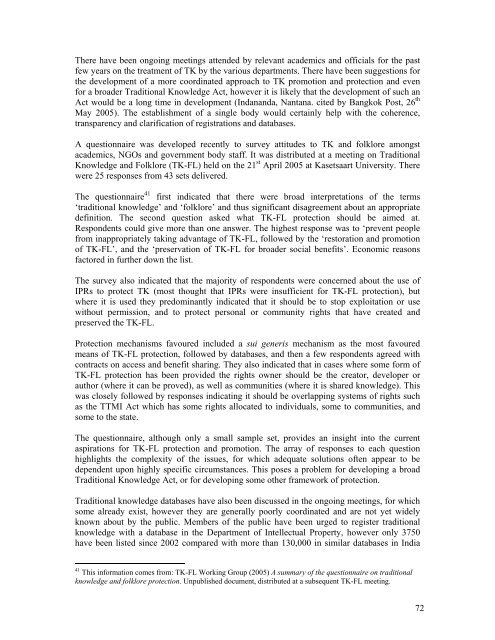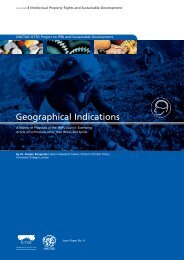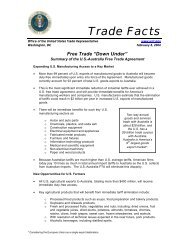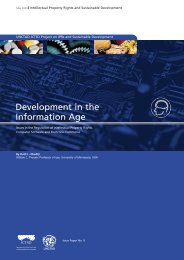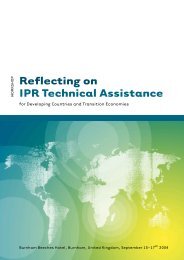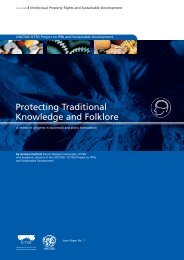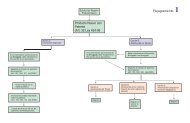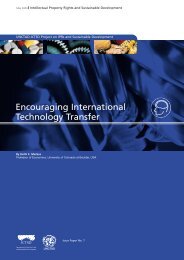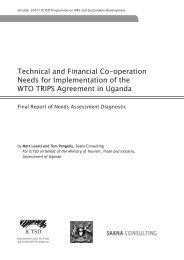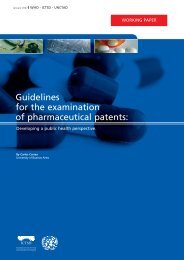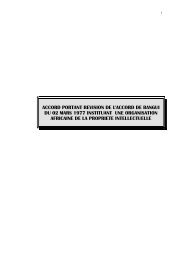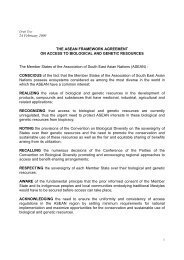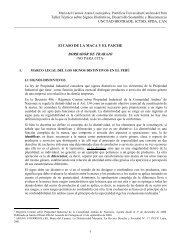Governance and Micropolitics of Traditional ... - IPRsonline.org
Governance and Micropolitics of Traditional ... - IPRsonline.org
Governance and Micropolitics of Traditional ... - IPRsonline.org
You also want an ePaper? Increase the reach of your titles
YUMPU automatically turns print PDFs into web optimized ePapers that Google loves.
There have been ongoing meetings attended by relevant academics <strong>and</strong> <strong>of</strong>ficials for the past<br />
few years on the treatment <strong>of</strong> TK by the various departments. There have been suggestions for<br />
the development <strong>of</strong> a more coordinated approach to TK promotion <strong>and</strong> protection <strong>and</strong> even<br />
for a broader <strong>Traditional</strong> Knowledge Act, however it is likely that the development <strong>of</strong> such an<br />
Act would be a long time in development (Indan<strong>and</strong>a, Nantana. cited by Bangkok Post, 26 th<br />
May 2005). The establishment <strong>of</strong> a single body would certainly help with the coherence,<br />
transparency <strong>and</strong> clarification <strong>of</strong> registrations <strong>and</strong> databases.<br />
A questionnaire was developed recently to survey attitudes to TK <strong>and</strong> folklore amongst<br />
academics, NGOs <strong>and</strong> government body staff. It was distributed at a meeting on <strong>Traditional</strong><br />
Knowledge <strong>and</strong> Folklore (TK-FL) held on the 21 st April 2005 at Kasetsaart University. There<br />
were 25 responses from 43 sets delivered.<br />
The questionnaire 41 first indicated that there were broad interpretations <strong>of</strong> the terms<br />
‘traditional knowledge’ <strong>and</strong> ‘folklore’ <strong>and</strong> thus significant disagreement about an appropriate<br />
definition. The second question asked what TK-FL protection should be aimed at.<br />
Respondents could give more than one answer. The highest response was to ‘prevent people<br />
from inappropriately taking advantage <strong>of</strong> TK-FL, followed by the ‘restoration <strong>and</strong> promotion<br />
<strong>of</strong> TK-FL’, <strong>and</strong> the ‘preservation <strong>of</strong> TK-FL for broader social benefits’. Economic reasons<br />
factored in further down the list.<br />
The survey also indicated that the majority <strong>of</strong> respondents were concerned about the use <strong>of</strong><br />
IPRs to protect TK (most thought that IPRs were insufficient for TK-FL protection), but<br />
where it is used they predominantly indicated that it should be to stop exploitation or use<br />
without permission, <strong>and</strong> to protect personal or community rights that have created <strong>and</strong><br />
preserved the TK-FL.<br />
Protection mechanisms favoured included a sui generis mechanism as the most favoured<br />
means <strong>of</strong> TK-FL protection, followed by databases, <strong>and</strong> then a few respondents agreed with<br />
contracts on access <strong>and</strong> benefit sharing. They also indicated that in cases where some form <strong>of</strong><br />
TK-FL protection has been provided the rights owner should be the creator, developer or<br />
author (where it can be proved), as well as communities (where it is shared knowledge). This<br />
was closely followed by responses indicating it should be overlapping systems <strong>of</strong> rights such<br />
as the TTMI Act which has some rights allocated to individuals, some to communities, <strong>and</strong><br />
some to the state.<br />
The questionnaire, although only a small sample set, provides an insight into the current<br />
aspirations for TK-FL protection <strong>and</strong> promotion. The array <strong>of</strong> responses to each question<br />
highlights the complexity <strong>of</strong> the issues, for which adequate solutions <strong>of</strong>ten appear to be<br />
dependent upon highly specific circumstances. This poses a problem for developing a broad<br />
<strong>Traditional</strong> Knowledge Act, or for developing some other framework <strong>of</strong> protection.<br />
<strong>Traditional</strong> knowledge databases have also been discussed in the ongoing meetings, for which<br />
some already exist, however they are generally poorly coordinated <strong>and</strong> are not yet widely<br />
known about by the public. Members <strong>of</strong> the public have been urged to register traditional<br />
knowledge with a database in the Department <strong>of</strong> Intellectual Property, however only 3750<br />
have been listed since 2002 compared with more than 130,000 in similar databases in India<br />
41 This information comes from: TK-FL Working Group (2005) A summary <strong>of</strong> the questionnaire on traditional<br />
knowledge <strong>and</strong> folklore protection. Unpublished document, distributed at a subsequent TK-FL meeting.<br />
72


